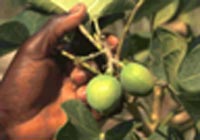|
Bio Diesel :
the new renewable energy
source India meets only 30% of the oil and gas requirements through domestic supplies. In 20 years it would come down to just 15%. Keeping in view the limited availability of conventional resources, we should aim at promoting renewable energy sources. Planning and implementation of renewable energy strategy for rural areas is the need of the hour. There was an urgent need to focus attention on the use of efficient technologies. Proper development of renewable sources is a must for sustainable development. Oil prices are galloping in the world market. The last few months have seen a rapid increase in the world petroleum prices to almost $55 per barrel. The number of vehicles on road is also rapidly increasing. Given that the fossil fuel reserves are fast depleting, newer sources have to be tried out, in order to meet the demand. Bio-fuels are an emerging option. A programme on bio-fuels was initiated in the CLEAN-India partner schools and later exhibited in the community. What are bio-fuels? Bio-fuels are renewable energy fuels obtained from vegetable oils. Bio-fuels, derived from renewable
plant sources, hold immense potential for meeting India’s future energy needs. Bio-diesel is obtained from trans-esterification of vegetable oils. Both edible and non-edible oils can be used for the purpose. But given the increasing population and consumption of edible oils in India, they are not preferred for energy generation. India has vast resources of non-edible/wild seeds from which oil can be derived to develop bio-diesel, depending upon the potential and specific needs in the locality. Experiments have shown that bio-diesel from non-edible oil seeds can be used in existing designs of diesel engines without any substantial modification. These include diesel powered cars, trucks, tractors, boats, shipping equipment, irrigation systems, mining equipment and electrical generators. Pongamia, Jatropha, Neem, Simarouba, Rapeseed and Mahua are species that yield seeds rich in oil for bio-diesel. Most of these species produce seeds having 32-35% oil content.
Of these, Pogamia and Jatropha are emerging as favorites. These species yield about 1800-1900 lts of oil per hectare. Both the species are drought resistant hardy shrubs. They can easily grow on areas of low rainfall and wastelands and do not require tillage. These plants help in upgrading the quality of the soil besides controlling erosion and desertification. Some of the plants even have medicinal uses. The plants are also not browsed by cattle. They are fast growing and start giving economic yields at the end of fourth year. Also since the fuel blends easily with diesel, there is no need for engine modifications. Benefits of using bio-diesel over conventional diesel
Use of bio-fuels will reduce dependence on crude oil import and raise energy security in rural areas. It will also generate employment in rural areas besides rehabilitating degraded and unutilized community lands. Apart from its use in bio-diesel, the oil can be used in production of soap, lighting lamps and fuel for cooking stove. The de-oiled cakes can be used as animal feeds and as a fertilizer.
The authors are working with Jan Vikas Society, the CLEAN-India partner at Kurnool, Andhra Pradesh. |
||||||||||||||||||||||||||||||||

 As
part of display by CLEAN-Kurnool students, crude oil was collected from
local resources and refined by Sri.Lakshmi High School. The Hon‘ble
Minister who was an engineer himself refilled the tank of auto-rickshow
with Bio-diesel (Pongamia) and drove the vehicle. It was a successful
run without emission of any smoke. The auto driver Mr.Khaja Vali himself
drove the vehicle on the open grounds. Apart from the media, the event
was attended by teachers, students and representatives from various
NGOs, the forest department, transport department etc.
As
part of display by CLEAN-Kurnool students, crude oil was collected from
local resources and refined by Sri.Lakshmi High School. The Hon‘ble
Minister who was an engineer himself refilled the tank of auto-rickshow
with Bio-diesel (Pongamia) and drove the vehicle. It was a successful
run without emission of any smoke. The auto driver Mr.Khaja Vali himself
drove the vehicle on the open grounds. Apart from the media, the event
was attended by teachers, students and representatives from various
NGOs, the forest department, transport department etc.